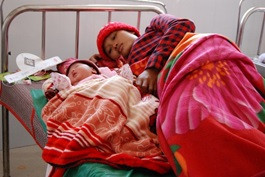Despite improvements in Cambodia, the national infant mortality rate remains high at 27 deaths per 1,000 live births.
Published: Jun 8, 2016 Reading time: 4 minutes Share: Share an articleThe knowledge gap among new mothers remains a critical barrier to improving health and wellbeing of infants and children. It is an issue which will affect the outcomes of these children, such as education and earning potential, for the rest of their lives.

“I do not know much about what to do after delivery and how to take care of myself or especially my baby. I will ask my mother if I have any problems or I am not sure with something,” said Sreymuoy, 22 years old mother who just delivered her first baby girl at Kampong Tralach Referral hospital, Kampong Chhnang province.
Sreymuoy is among the many new mothers who have very little health understanding and are often not clear on how to best take care of themselves and their babies. According to Ly Vanny, 28, a nurse at this referral hospital, “It is a common issue among young mothers in Cambodia due to low education and having limited access to information,” she says based on her experience working at this hospital for almost 10 years.
Located in Kampong Chhnang province, Kampong Tralach referral hospital was the first hospital in Cambodia to experience the innovative maternal and child health project known as “Healthy Family Community”, which aims to close the health knowledge gap through informative mini-dramas sent as specifically scheduled audio messages to mothers’ phones. It aims to contribute to the reduction of maternal and infant mortality and improve health and nutrition outcomes.
Launched three years ago, this mobile technology based approach has sent voice messages to mothers’ phones every week. To date, there have been more than ten thousand pregnant women and mothers registered to the system.
When registered, all pregnant women, mothers and carers are able to listen to the voice messages via their phone about health topics, including how to take care of the baby’s umbilical cord, recognizing danger signs, and avoiding harmful traditional practices.
Many villagers living in and outside of Kampong Tralach district have already received benefits from this system.
“I had never heard about this system before, but a midwife explained to me that it is a system that provides us with information regarding our health. I allowed her to connect my phone to the system because I want to know about the proper eating, what foods will be harmful to my health, and how to take care of my baby well,” Sreymuoy stressed.
A mother of two, Un Sreymoa lives close to the referral hospital and enjoys the voice messages, after having just delivered her second baby almost a month ago.

“I think I did not do so well with my first child. But now, I have learnt a lot regarding health care practices – and I have to pay close attention to my baby during her first month of life. I followed the instructions from the phone advising me to take care of the umbilical cord of my baby in order to avoid infection,” Sreymoa shared, after mentioning about her recent experience of going quickly to the referral hospital after seeing that her little baby was having difficulty breathing and her temperature had increased.
Sreymoa had such a fast response due to receiving information from the voice messages to always go to a local health care center immediately when noticing any unusual or dangerous signs on her baby.
Almost all the mothers who come to give birth at health centers in the district have been assisted by midwives or nurses to register their phones to the system. Nurse Vanny happily helps every mother to register – as she can see many positive changes achieved through the service.
“I can see a big difference between the registered mothers and those who are not. Registered mothers can keep their baby’s cord clean and dry, and their babies look healthy when they come to receive vaccinations 14 weeks after delivery,” stressed Vanny, adding that “I often heard those mums say to me that Neakrou [polite word people always call every health center staff], this system is like magic – they even know that my baby’s cord is already gone. I wonder how they know about it – they are so smart.”

This success has led to expansion of the service to Phnom Penh, Koh Kong and Kratie provinces, delivering 1,000 days worth of messages – this being the key period of development from pregnancy until a child is two years old. Improvements in health during this time are likely to have a life-changing impact on a child's future and help break the cycle of poverty.
Sreymoa is very happy with the system as she can have important knowledge without having to spend a half or full day in a meeting or training class. “I think I know best now about positioning my baby for proper feeding. And, I breastfeed my baby more often and for a longer period each time I breastfeed her – that is something I did not do quite as much for my first child,” said Sreymoa.
